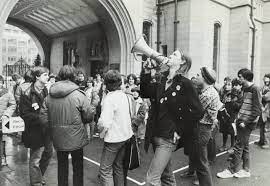On the 10th September 2009, the British Prime Minister, Gordon Brown, issued an apology to Alan Turing, culminating with the words “we’re sorry, you deserved so much better”. This apology came over 60 years after Turing’s ingenious cracking of the German Enigma code, which explicitly led to many British victories in WW2, such as the Battle of the Atlantic. During the war, Turing worked at Bletchley Park – more specifically, Hut 8, which was a section of the Government Code and Cypher School, tasked with deciphering German naval messages. It is here that his most notable achievement, the Bombe machine, was created.
Ellen Wilkinson: Manchester Graduate, Labour MP and Jarrow Crusader, by Chloe Gordon
Ellen Wilkinson (1891-1947) was a champion of the rights of women and the working-classes. During her influential political career, she was among the first female Labour MPs and the second woman to serve in the Cabinet. She had many nicknames including ‘Red Ellen’ (due to the colour of her hair and her socialist beliefs) and ‘Shelter Queen’ (because of her tremendous efforts in distributing half a million Morrison shelters as a Minister for Home Security during the Second World War). As a local Mancunian and University of Manchester History graduate, she is well deserving of the UoM building named in her honour.
People, Power and Protest: Manchester’s Students against South African Apartheid, by Jason Lee
Recently students across Manchester united in an empowering march for Reclaim the Night’s forty-fifth anniversary. Attendees protested in solidarity for women, sex worker, trans and non-binary victims of violent misogyny. Speakers talked of their experiences furthering the campaign for safer streets and for GMCA to cut ties with organisations harming women and sex workers. This march is part of a long history of student collective action for social justice. The students of Manchester Anti-Apartheid protest exemplifies this tradition and perhaps we can learn something from this movement to inform the activism of today.
‘Disorder’: A Brief History of Factory Records, by Erin Barnett
Factory Records was a fiercely independent and experimental Mancunian record label started by local news presenter and post-punk enthusiast, Tony Wilson. Though it closed down in 1992 its influence on Manchester and the UK music scene is undeniable and continues today. The history of its creation and philosophy reveals why Factory Records remains legendary in the collective conscience of Manchester.





